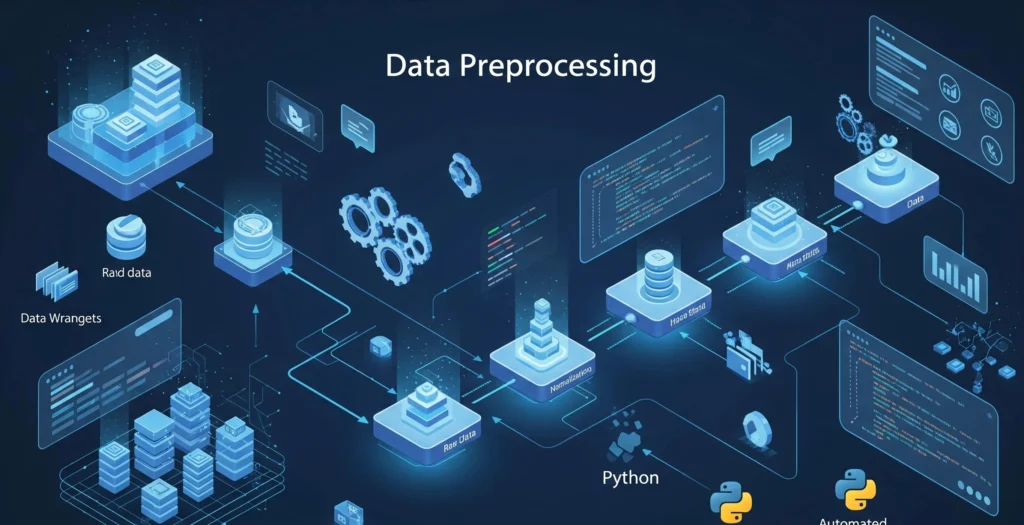As artificial intelligence (AI) changes industries, tech companies around the world are increasing their demand for skilled AI professionals. These experts are needed to build, deploy, and maintain intelligent systems on a large scale. AI now supports search algorithms, develops autonomous vehicles, detects fraud, and personalizes user experiences. It has moved from experimental stages to being a vital part of production. This shift creates a demand for engineers who have a mix of skills in math, programming, modeling, cloud technology, and communication.
In this guide, we explore the key AI development skills that tech companies will look for in 2025. Whether you’re preparing for a role in machine learning, deep learning, natural language processing, or MLOps, this article provides insights into the practical, theoretical, and strategic knowledge that recruiters and hiring managers expect from top candidates.
List of Top AI Development Skills Tech Companies Seek
1. Machine Learning and AI Basics

Every AI professional should have a strong grasp of the basic principles of artificial intelligence and machine learning. This covers reinforcement learning, supervised learning, and unsupervised learning. Companies seek engineers who understand not just what these models do, but how and why they work. Key concepts include:
- Bias-variance tradeoff
- Loss functions
- Regularization techniques
- Gradient descent and its variants
- Evaluation metrics
This mathematical and algorithmic foundation is essential for creating AI systems that perform well in real-world applications.
2. Python and Coding Practices

Python is the primary language for AI development. It features intuitive syntax and a wealth of libraries, making it a favorite in both research and industry. Every serious AI engineer needs to be skilled in:
- NumPy for linear algebra
- Pandas for data processing
- Visualization libraries like Matplotlib or Plotly
- Scikit-learn for classical ML algorithms
- Statsmodels for statistical modeling
- Joblib or Pickle for model serialization
Top companies, including leading AI Development Company India, value code readability, reusability, and clear documentation. Candidates should write modular code, organize projects with clear structure, and use version control with Git.
3. Expertise in Deep Learning Frameworks
Deep learning is becoming essential in AI. Knowledge of frameworks like PyTorch, TensorFlow, and JAX is crucial. Each framework has its strengths:
- PyTorch is great for research and quick prototyping.
- TensorFlow is preferred for its scalability in production environments.
- The high-performance computing capabilities of JavaScript are well-known.
Developers should be comfortable with tasks such as building custom neural networks and managing GPU acceleration.
4. Data Preprocessing and Pipeline Development

Real-world data often comes unclean, incomplete, and unstructured. AI developers need experience preparing datasets for training and validation, which includes:
- Data cleaning
- Normalization and standardization
- Categorical encoding
- Text preprocessing
- Image preprocessing
Familiarity with automated data pipeline tools is also important. Companies may expect knowledge of tools like Apache Airflow and Spark.
5. Cloud Infrastructure and Scalable AI Development

Cloud computing is essential for tasks like training large neural networks and real-time inference. AI professionals should be skilled in using services from major providers such as:
- AWS
- Google Cloud
- Azure
They must know how to provision GPU instances, set up auto-scaling clusters, and monitor resources, often using tools like Docker and Kubernetes.
Also read: Cloud Computing Platforms
6. MLOps and Continuous Deployment Pipelines
Building a model is one step, but maintaining it in production is another challenge. MLOps combines software practices with data science tools to streamline the machine learning lifecycle. Important components include:
- Model versioning
- Tracking
- CI/CD integration
- API exposure
- Monitoring models
Companies will assess candidates on their understanding of model management and post-deployment monitoring.
7. Applied Mathematics, Linear Algebra, and Statistics
Mathematics supports every decision-making and optimization process in AI. Engineers must be familiar with:
- Matrix multiplication and projections
- Probability and statistics
- Calculus
- Optimization techniques
These concepts are essential for tasks like hyperparameter tuning and model validation.
8. Large Language Models (LLMs) and Natural Language Processing (NLP)
NLP is now a highly sought-after specialization thanks to generative AI and LLMs. Engineers ought to comprehend:
- Tokenization and embeddings
- Transformer architecture
- Pretrained models
- Transfer learning
- Prompt engineering
Familiarity with libraries like Hugging Face Transformers and spaCy is important for NLP tasks.
9. Computer Vision and Image Intelligence

Computer vision leads many AI applications, such as facial recognition and autonomous vehicles. Employers look for engineers who understand:
- Convolutional Neural Networks (CNNs)
- Object detection models
- Segmentation algorithms
- Image augmentation
Professionals should be able to handle the full workflow—from data labeling to deployment.
10. Explainability, Interpretability, and Responsible AI
AI is used in critical areas like hiring and healthcare, creating a need for transparency. Companies want developers who can build accurate and interpretable models. Techniques and tools include:
- SHAP
- LIME
- Captum
- Fairlearn and Aequitas
- Counterfactual explanations
Understanding regulations like GDPR is also valuable in enterprise roles.
11. Prompt Engineering and Generative AI Integration
In the post-ChatGPT landscape, prompt engineering is a growing skill. Companies often need developers to integrate LLMs into their products by designing effective prompts and managing templates.
12. Real-Time AI and Edge Deployment
Increasingly, applications require low-latency inference, especially in fields like IoT and gaming. Engineers should understand:
- Streaming architectures
- Model compression techniques
- Edge deployment capabilities
13. Soft Skills and Cross-Functional Collaboration
Technical skills alone aren’t enough. AI engineers often work across product, design, and compliance teams. Companies look for candidates who can communicate complex ideas to stakeholders, plan projects, and work collaboratively.
Case Study: AI at Scale, The Rise of AI Engineering at Google and Amazon
To understand how AI development skills translate into real-world careers, let’s look at how industry leaders like Google and Amazon have implemented AI on a large scale and the types of roles they’ve created along the way.
Google, From Search to Generative AI
Google’s journey with AI started with algorithmic search and has expanded into products like Google Assistant, Bard (now Gemini), and TensorFlow. At Google, AI roles are varied and specialized, including:
- AI Software Engineers who work on scalable training pipelines for LLMs
- ML Researchers who are advancing transformer efficiency and alignment
- Responsible AI Engineers focused on reducing errors and bias in models
- AI Product Managers who connect user needs with technical possibilities
Google has made open-source tools like TensorFlow, TFLite, and JAX available, changing the AI toolchain worldwide. AI developers at Google need to grasp not only complex architectures like sparse transformers and Mixture of Experts (MoE) but also the challenges of deploying on Android devices, handling multilingual NLP, and working with federated learning.
Key takeaway: At companies like Google, AI engineers must work at the cutting edge of scale, efficiency, and safety. It’s not enough just to train a model; you have to optimize it for billions of users, devices, and regulatory requirements.
Amazon, AI for Logistics, Personalization, and Alexa
Amazon’s AI strategy is woven into its supply chain, e-commerce personalization engine, AWS cloud services, and Alexa. A typical ML workflow at Amazon involves:
- Predictive modeling for demand forecasting and warehouse optimization
- Real-time recommendation systems that use collaborative filtering and deep learning
- Speech recognition and NLP in Alexa’s multilingual interface
- Fraud detection and risk modeling in financial transactions and reviews
- Amazon employs a variety of AI professionals, including:
- Applied scientists who create experiments and enhance model functionality
- ML Platform Engineers who handle model registries and feature stores
- Cloud AI Architects who assist clients in deploying models using SageMaker and Lambda
Amazon emphasizes MLOps, scalable APIs, and real-time performance monitoring, making it a hotspot for AI engineers looking to create systems that work globally.
The main message is that Amazon is looking for engineers with the ability to create machine learning models and implement them in dispersed, vital systems.. Skills in real-time streaming, DevOps, and cloud architecture are highly sought after.
The Future of AI and the Job Market, What Lies Ahead

The global AI job market is set for significant growth and change. According to McKinsey, AI could generate up to $4.4 trillion annually in economic value across various sectors by 2030. However, this growth will bring a major shift in the skills companies need.
Emerging Job Roles in AI :
Prompt Engineers and LLM Architects
As LLMs become fundamental tools, companies are hiring specialists to refine, chain, and prompt large models for specific applications.
AI Ethics and Governance Officers
With increasing regulatory demands (like the EU AI Act), roles focused on compliance, fairness, and transparency are becoming vital in larger organizations.
Edge AI Engineers
There is a growing need for experts who can run AI models directly on devices, such as wearables, smart vehicles, and IoT devices.
Synthetic Data Engineers
Engineers with expertise in GANs, data simulation, and synthetic augmentation are joining the area to enhance scarce datasets.
AI System Integrators
Not everyone will create models from the ground up. Companies also need professionals who can integrate foundational models into their workflows using APIs, RAG systems, and vector databases.
Industry Demand Outlook
- Healthcare: AI is becoming more and more involved in medical imaging, drug development, patient triage, and diagnostics. Regulatory expertise is vital.
- Finance: Algorithmic trading, fraud detection, and credit scoring are increasingly driven by AI, requiring expertise in transparency and risk modeling.
- Education: AI tutors, adaptive learning systems, and automated grading are creating new overlaps between teaching methods and AI development.
- Media: Generative AI is transforming content creation. There’s increasing demand for prompt designers, video-to-text model engineers, and creative AI specialists.
- Legal: AI is being utilized for contract analysis, case summaries, and legal research, leading to roles for NLP experts who comprehend specific legal language.
- Reskill continuously: The pace of AI tool development is rapid. Stay updated with frameworks, research, and deployment tools.
- Build specialization: General AI skills are helpful, but expertise in specific areas (like medical AI or legal NLP) will drive hiring in niche markets.
- Think systemically: Employers prefer candidates who understand not only models but also data handling, infrastructure, ethics, and user experience.
Conclusion
As AI becomes a core part of modern business infrastructure, the demand for specialized AI developers is accelerating across industries. Companies no longer seek generalists—they want engineers who possess strong AI development skills and can turn AI theory into real-world, scalable solutions. Foundational skills in Python and machine learning are essential, but advanced expertise in deep learning, cloud deployment, model interpretability, and tools like TensorFlow, PyTorch, and Hugging Face are becoming prerequisites.
AI development skills tech companies seek now extend far beyond model creation they include secure deployment, fairness evaluation, continuous monitoring, and production-level optimization. Knowledge of MLOps, data versioning, and vector databases like Pinecone is increasingly important.
Leading tech companies like Google and Amazon highlight the shift toward domain-specific AI roles such as Responsible AI Engineers and Edge AI Specialists. Looking ahead, roles in AI ethics, compliance, and synthetic data will continue to grow. To stay competitive, developers must blend technical skill with ethical and contextual problem-solving.
FAQs
1. What are the most important programming languages for AI development?
Python is the most widely used language due to its simplicity and large ecosystem of AI libraries. However, languages like C++ (for performance), R (for statistical modeling), Java (for enterprise-scale systems), and SQL (for data manipulation) are also valuable depending on the use case.
2. Do I need a PhD to get a job in AI?
No, a PhD is not mandatory. Many AI roles are filled by professionals with bachelor’s or master’s degrees in computer science, data science, or related fields, especially if they have hands-on project experience and a strong portfolio.
3. Which deep learning framework should I learn first?
Both TensorFlow and PyTorch are industry standards. PyTorch is often preferred for research and experimentation, while TensorFlow is widely used in production. Learning either one is acceptable, but PyTorch is generally more beginner-friendly.
4. What are MLOps skills, and why do they matter?
MLOps combines machine learning with DevOps to ensure models are deployable, maintainable, and scalable. Skills in model versioning, monitoring, CI/CD, and containerization (Docker, Kubernetes) are increasingly required in AI production roles.
5. How important is cloud computing knowledge for AI jobs?
Very important. Scalable resources for AI model training and deployment are offered by cloud platforms such as AWS, Google Cloud, and Azure. Familiarity with cloud-based ML tools (like SageMaker or Vertex AI) is a major plus.

